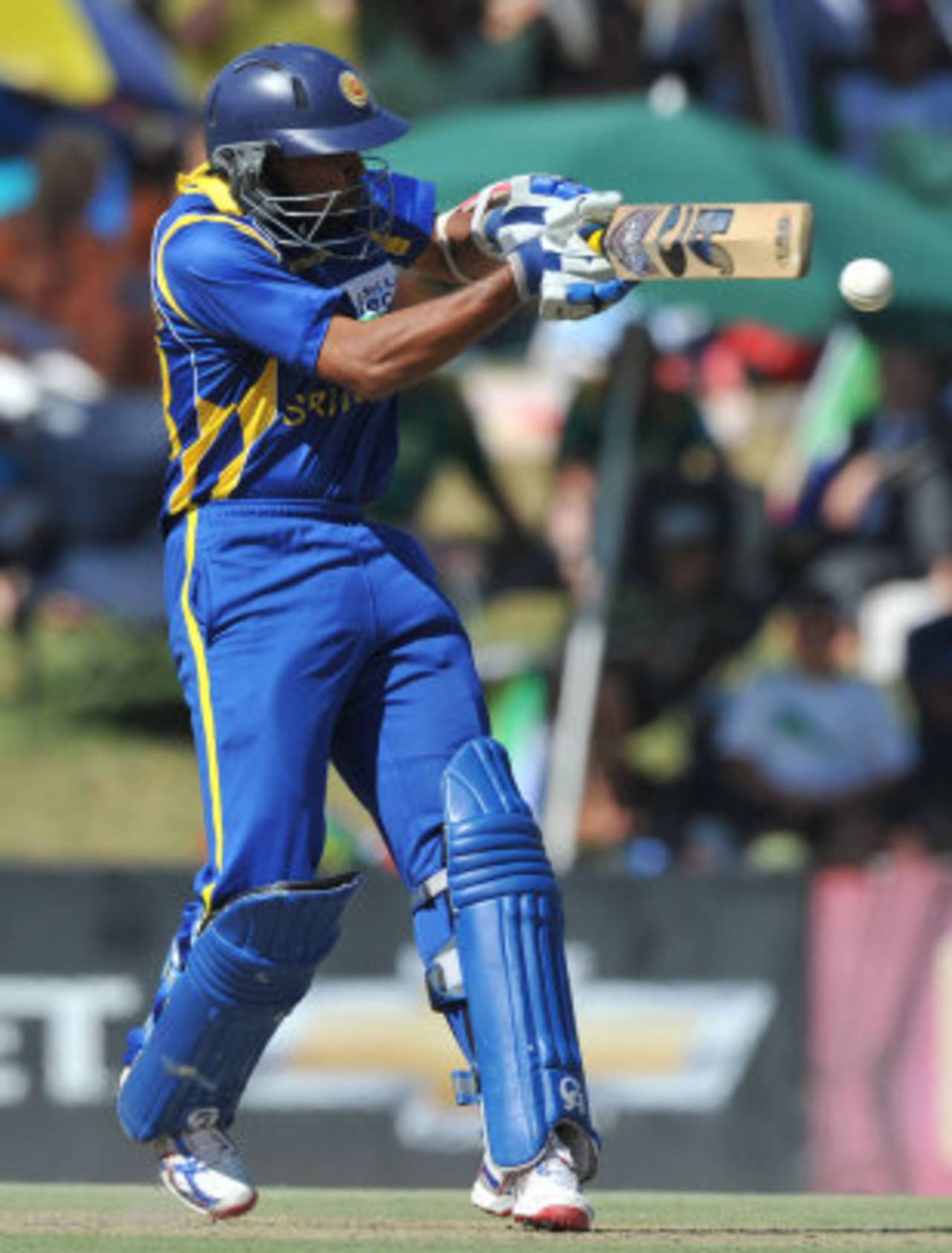Dilshan rues Duckworth-Lewis denouement
Had it not rained, and if the full 50 overs of the South African innings had been bowled, Tillakaratne Dilshan may have been able to smile whole-heartedly for the first time this year
Firdose Moonda in Bloemfontein
18-Jan-2012

For the first time in the series, Tillakaratne Dilshan looked ready to bide his time, but he still threw it away in the 30s • Getty Images
Irony can be cruel and it played one of its most callous cards when Sri Lanka's bid to stay alive in the series was killed off by wet weather. After the favours rained on them in that famous relegation game in the 2003 World Cup - when South Africa's mathematical deficiency meant the showers fell in Sri Lanka's favour - the wheel was bound to turn at some stage.
When it did, it was violent. Sri Lanka were crushed when they had already been beaten, and even though they got better, they were never quite good enough. So far, their series has been characterised by starts with the bat without pushing on, wayward bowling that lacks penetration and a fielding side that can look worse than a leaky tap.
A montage of Tillakaratne Dilshan's expressions as the series has progressed would tell a tale of hope turning into despair, disappointment and ultimately disillusion. Dilshan, like anyone involved in the series, expected fifty-over contests that would be compelling and competitive. He did not see this coming.
After Paarl, where he had struggled to explain exactly what had happened, the expectations appeared too great and a repair job had to be done before East London. Even though Sri Lanka's batting effort in East London was close to five-and-a-half times better in numerical terms, it wasn't enough to give them a win. In Bloemfontein, they achieved and surpassed their stated goal of 250, and had a real chance of keeping themselves alive in the series when weather intervened.
It could have been different. One more wicket would have put them into the South African tail and changed the Duckworth-Lewis equation. One less run in Lasith Malinga's last over, the wide perhaps, could have changed the complexion of a tight chase. One more save in the field could have eventually left South Africa just short. Ifs and buts are useless now that the series has been lost.
It was difficult to look at Dilshan's face on Tuesday night. He has appeared at a loss before. When he was hit for two back-to-back fours off an over in East London, for example, he wore an expression of extreme exasperation. When he carelessly lost his wicket in Bloemfontein, he seemed to be angry with himself, for the first time in a series where that sort of self-fury could have emerged after every one of his dismissals. But when he arrived to address the media after Sri Lanka conceded the series, the helplessness on his face was pitiful.
"Everything is coming against us," he said, with a small shake of the head. "We had a good chance to win this one-dayer but we can't control the rain."
No, they cannot and this time it worked against them. Had it not rained, and if the full 50 overs of the South African innings had been bowled, Dilshan may have been able to smile whole-heartedly for the first time this year. Instead, he was forced to look at the core of Sri Lanka's problems starting with the simple fact that every time they got better, South Africa did too.
Although Hashim Amla and Jacques Kallis were rested for the last three games, South Africa had Faf du Plessis to take charge of the chase. Although the seamers struggled on a flat, hard pitch that required them to bend their backs, Robin Peterson bowled 10 impressive overs to keep Sri Lanka in check. Once again, it was a case of not enough runs for the visitors - they were on track to score in excess of 300, after reaching 155 for 3 after 30 overs, but finished with 266 for 9.
"All their spinners bowled well but we needed one guy to continue batting after getting a start," Dilshan said. "One guy should bat 40 to 45 overs in the top order. We were short another 20 runs today. Before we started I thought 250 or 260 will be a good total. But when we started batting I thought 280."
This time, that batsman could have been Dilshan himself. He had a quiet start and scored his first boundary only after 41 balls. He even brought out the Dilscoop, a shot that suggested he was feeling in control. Then, he simply tossed it away and for the first time he admitted that he knew he had done the wrong thing. "They bowled a tight line to me so I didn't want to take any chances at the beginning," he said. "Upul was scoring well so I had no need to take any chances. I wanted to bat throughout the innings and I was really disappointed to get out in the 30s."
Already, questions have arisen about Dilshan's ability to lead and suggestion is thick in the air that his captaincy lease will not be renewed once the series is over. Dilshan said he will not terminate it himself. "I have to finish this one-day series. I have been appointed for this," he said. "And I will captain for the next few series if asked."
There's no point even thinking that far. For now, Dilshan will have to lift his team and stave off a rampant South African side that is eyeing a whitewash. "We are doing everything in preparation but everything is going wrong for us," he said. "We are getting close but we can't finish it off. We have to finish strongly."
Firdose Moonda is ESPNcricinfo's South Africa correspondent